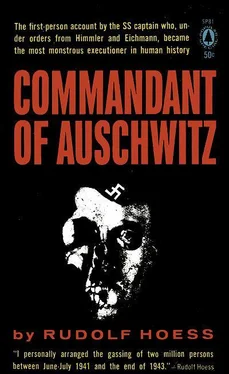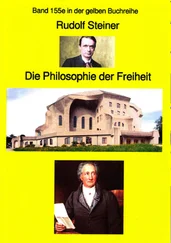These basic principles on which I was brought up became part of my flesh and blood. I can still clearly remember how my father, who on account of his fervent Catholicism was a determined opponent of the Reich government and its policy, never ceased to remind his friends that, however strong one’s opposition might be, the laws and decrees of the state had to be obeyed unconditionally.
From my earliest youth I was brought up with a strong awareness of duty. In my parents’ house it was insisted that every task be exactly and conscientiously carried out. Each member of the family had his own special duties to perform. My father took particular care to see that I obeyed all his instructions and wishes with the greatest meticulousness. I remember to this day how he hauled me out of bed one night, because I had left the saddlecloth lying in the garden instead of hanging it up in the barn to dry, as he had told me to do. I had simply forgotten all about it. Again and again he impressed on me how great evils almost always spring from small, apparently insignificant misdeeds. At that time I did not fully understand the meaning of this dictum, but in later years I was to learn, through bitter experience, the truth of his words.
The relationship between my parents was one of loving respect and mutual understanding. Yet I never remember any display of tenderness; but at the same time I never heard them exchange an angry word. While my two sisters, who were four and six years younger than I, were very affectionate and were always hanging about their mother, I had always, from my earliest years, fought shy of any sign of tenderness, much to the regret of my mother, and of all my aunts and other relatives. A handshake and a few brief words of thanks were the most that could be expected of me.
Although both my parents were devoted to me, I was never able to confide in them the many big and little worries that from time to time beset a child’s heart. I had to Work all my problems out, as best I could, for myself. My sole confidant was my pony, and I was certain that he understood me. My two sisters were very attached to me, and were perpetually trying to establish a loving and sisterly relationship. But I never wished to have much to do with them. I shared in their games only when I had to, and then I would nag at them until they ran crying to my mother. Many were the practical jokes that I played on them. But despite all this, their devotion to me remained unchanged and they always regretted, and still do to this day, that I was never able to have any warmer feelings for them. They have always been strangers to me.
I had the greatest respect, however, for both my parents, and looked up to them with veneration. But love, the kind of love that other children have for their parents, which I myself later learned to know, I was never able to give them. Why this should have been I have never understood. Even today I can find no explanation.
I was not particularly well-behaved, and certainly not a model child. I was up to all the tricks normal to a boy of my age. I played pranks with the others and took part in the wildest games and brawls, whenever the opportunity came my way. Although there were always times when I had to be on my own, I had enough friends to play with when I wanted to. I stood no nonsense, and always held my own. If I were the victim of an injustice, I would not rest until I considered it avenged. In such matters I was implacable, and was held in terror by my classmates. Incidentally, during the whole of my time at the grammar school I shared a bench with a Swedish girl who wanted to be a doctor. We always remained good friends and never quarreled. It was the custom at our school for the same pupils to share a bench during the whole time they were at school together.
When I was thirteen years old, an incident occurred which I must regard as marking the first shattering of the religious beliefs to which I adhered so firmly.
During one of the usual scuffles that took place at the entrance to the gymnasium, I unintentionally threw one of my classmates downstairs. He broke an ankle as a result. During the years, hundreds of schoolboys must have tumbled down those stairs, I among them, and none had ever been seriously hurt. This particular boy was simply unlucky. I was given three days’ confinement. It was a Saturday morning. That afternoon I went to confession as I did every week, and I made a clean breast of this accident. I said nothing about it at home, however, as I did not wish to spoil my parents’ Sunday. They would learn about it soon enough next week. My confessor, who was a good friend of my father’s, had been invited to our house that same evening. Next morning I was taxed by my father concerning the accident, and duly punished because I had not told him about it straight away. I was completely overwhelmed, not on account of the punishment, but because of this undreamed-of betrayal on the part of the confessor. I had always been taught that the secrets of the sacred confessional were so inviolable that even the most serious offenses there confided to the priest would never be revealed by him. And now this priest, in whom I had placed such implicit trust, to whom I regularly went for confession, and who knew by heart all the ins and outs of my petty sins, had broken the seal of the confessional over a matter as trifling as this! It could only have been he who had told my father of the accident, for neither my father nor my mother nor anyone at home had been into town that day. Our telephone was out of order. None of my classmates lived in the neighborhood. No one, other than this priest, had visited us. For a very long time I brooded over all the details of this incident, so monstrous did it appear to me. I was then, and still remain, completely convinced that the priest had broken the seal of confessional secrecy. My faith in the sacred priesthood had been destroyed and doubts began to arise in my mind for the first time. I no longer went to this priest for confession. When he and my father took me to task on that account, I was able to make the excuse that I went to confession’ in our school church, to the priest who gave us religious instruction. This seemed plausible enough to my father, but I am convinced that my former confessor knew my real reason. He did everything to win me back, but I could no longer bring myself to confess to him. In fact I went further and gave up going to confession altogether, since I no longer regarded the priesthood as worthy of my trust.
I had been taught at school that God meted out severe punishment to those who went to Holy Communion without first making their confession. It might even happen that such sinners would be struck dead at the communion rail.
In my childish ignorance I earnestly beseeched our heavenly Father to make allowances for the fact that I was no longer able to go to confession, and to forgive my sins which I then proceeded to enumerate. Thus did I believe that my sins had been forgiven me, and I went with trembling heart, uncertain as to the Tightness of my actions, to Communion in a church where I was unknown. Nothing happened! And I, poor, miserable worm, believed that God had heard my prayer, and had approved of what I had done.
My spirit, which in matters of belief had up to then been so peacefully and surely shepherded, had been severely shaken and the deep, genuine faith of a child had been shattered.
The next year my father died suddenly. I cannot remember that I was much affected by this. I was perhaps too young to appreciate my loss fully. And as a result of his death my life took a very different turn from that which he had wished.
The war broke out. The Mannheim garrison set off for the front. Reserve formations were created. The first trainloads of wounded arrived from the front. I was hardly ever at home. There was so much to see, and I did not want to miss anything. I pestered my mother until she gave me permission to enroll as an auxiliary with the Red Cross.
Читать дальше












